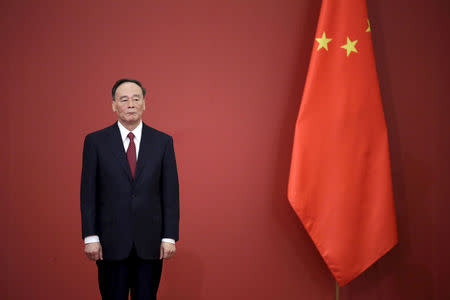Refocus of China's anti-graft campaign means almost anyone a target
By Ben Blanchard BEIJING (Reuters) - As the number of high-profile "tigers" caught in China's crackdown on corruption falls, the ruling Communist Party has turned its fight to its most junior officials, meaning almost anyone is now a target. Rules set to be unveiled at a key party meeting next week will intensify what China calls "intra-party supervision" to ensure its members are clean in the absence of an independent anti-corruption body which the country says it does not need. Soon after President Xi Jinping assumed the top post of general secretary in late 2012, the party issued "eight rules" to leaders demanding that they shun extravagance and guard against abuses of power. The number of "flies", as the party calls junior cadres guilty of corruption, being investigated has soared. From late 2012 to August this year, 91,913 people were given administrative punishments for graft, 80 percent of whom were the lowest level of officials, according to party statistics. The breadth of the expanded campaign has created uncertainty and even fear for some. But Xi's corruption battle has proved popular with a public fed up with tales of civil servants boozing it up on taxpayers' money or taking bribes to approve projects. "The anti-corruption campaign can only deepen," a source with ties to the leadership told Reuters. "There are lots of little tigers left to capture. There is still resistance" to the campaign, the source said, speaking on condition of anonymity to avoid repercussions for talking to a foreign reporter without permission. The state-run Global Times said next week's annual party plenum would develop new strategies to "crush some officials' alleged passive resistance" to the campaign, noting some officials "still dream the anti-corruption drive will lose steam". The party has been keen to put such sentiment to rest, even if it has given no details as to what new or revised rules the plenum, held under tight secrecy in Beijing, will come up with. "Being a party member who is up to scratch is not something for today or tomorrow, something that can be accomplished in one move or one done once and then forgotten about," the party's anti-graft watchdog, the Central Commission for Discipline Inspection, said on its website this month. "Being up to standard is something that is always to be worked on. There is no end to this process." Still, after an initial shock-and-awe phase of the battle which saw dozens of top tigers investigated and jailed, including the once fearsome domestic security chief, Zhou Yongkang, there are now fewer senior officials being caught. SHIFT IN FOCUS The most prominent case so far this year was the mayor of Beijing's neighboring metropolis of Tianjin, placed under investigation last month, political analysts say. He Jiahong, a prominent anti-corruption expert at Beijing's elite Renmin University, said there was no way the party could bring down dozens of tigers every year, hence the shift in focus. "Anti-corruption needs to shift from investigating and dealing with cases towards institutional building," He said. But two key platforms which the party has previously promised to push - public asset disclosures for officials and a dedicated anti-corruption law - have languished amid resistance from some who fear light being shone on a problem the party has previously wanted to handle internally. China's top graft buster, Wang Qishan, wants senior party officials to have to declare their assets, a source who regularly meets senior officials told Reuters. "Wang Qishan has been trying to push this through since 2012, but there is very strong opposition," the source said, referring to the year Xi came to power. "It may be discussed during the plenum." The meeting comes ahead of a twice-in-a-decade party congress in 2017, when most of China's top decision-making body are expected to retire, though Xi will remain in power. Neither the discipline commission, nor the State Council Information Office, which doubles as the party spokesman's office, responded to requests for comment on what will be decided at the plenum. Seeking to carry the momentum, the commission has been giving regular updates of the kinds of relatively minor bad behavior it has gone after. In one case, a city official in northeastern China spent more than 4,000 yuan ($600) in government funds on a banquet featuring salmon sashimi and two bottles of maotai, a liquor traditionally served at the kind of fancy events now frowned upon. In another case, an academic added on trips to tourist sites in Belgium and France while he was on a scholastic exchange in Germany and Austria. He was fired. Reuters was not able to reach either of these people for comment. Many of the officials are given administrative party punishments, such as demotions or black marks against their names. A small proportion are prosecuted. The most common infraction is misuse of official vehicles - which broadly means driving a government-owned car for private use - followed by misuse of government subsidies and extravagant weddings. Expectations for results in the corruption battle are high. The Pew Research Center report on China's place in the world found that some two-thirds of respondents expect progress to be made in the next five years. (Additional reporting by Benjamin Kang Lim; Editing by Nick Macfie)





